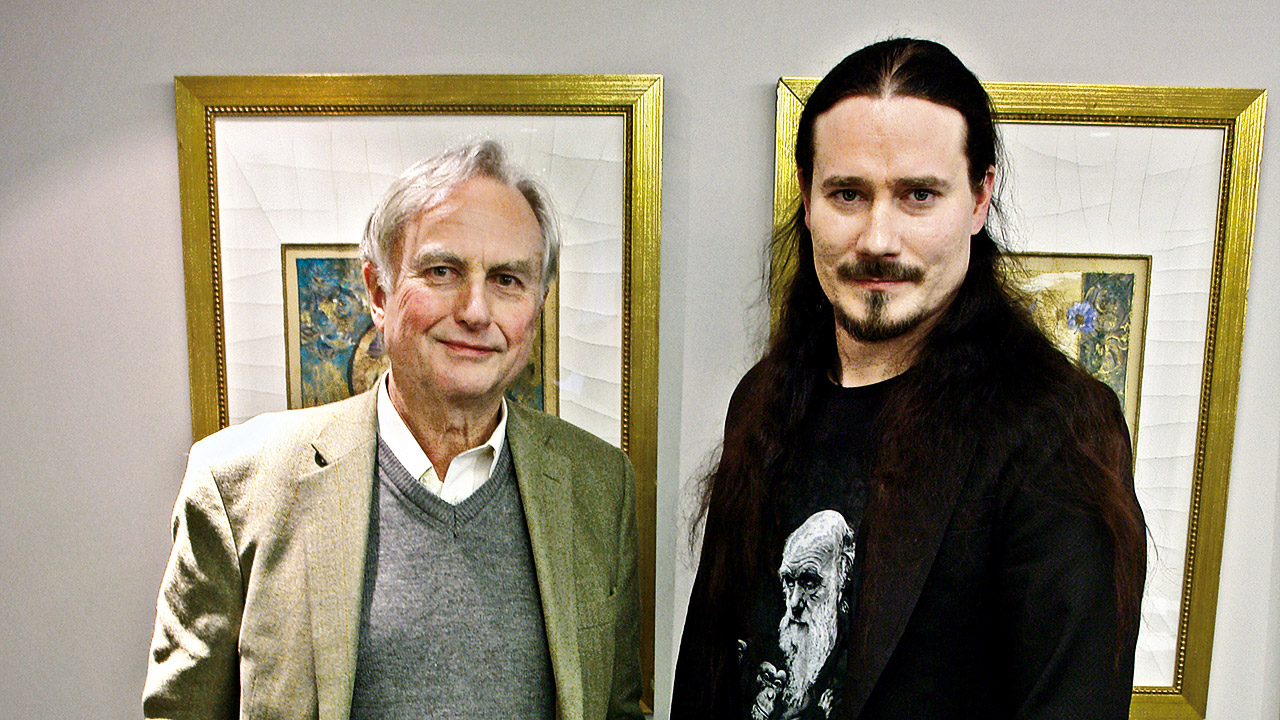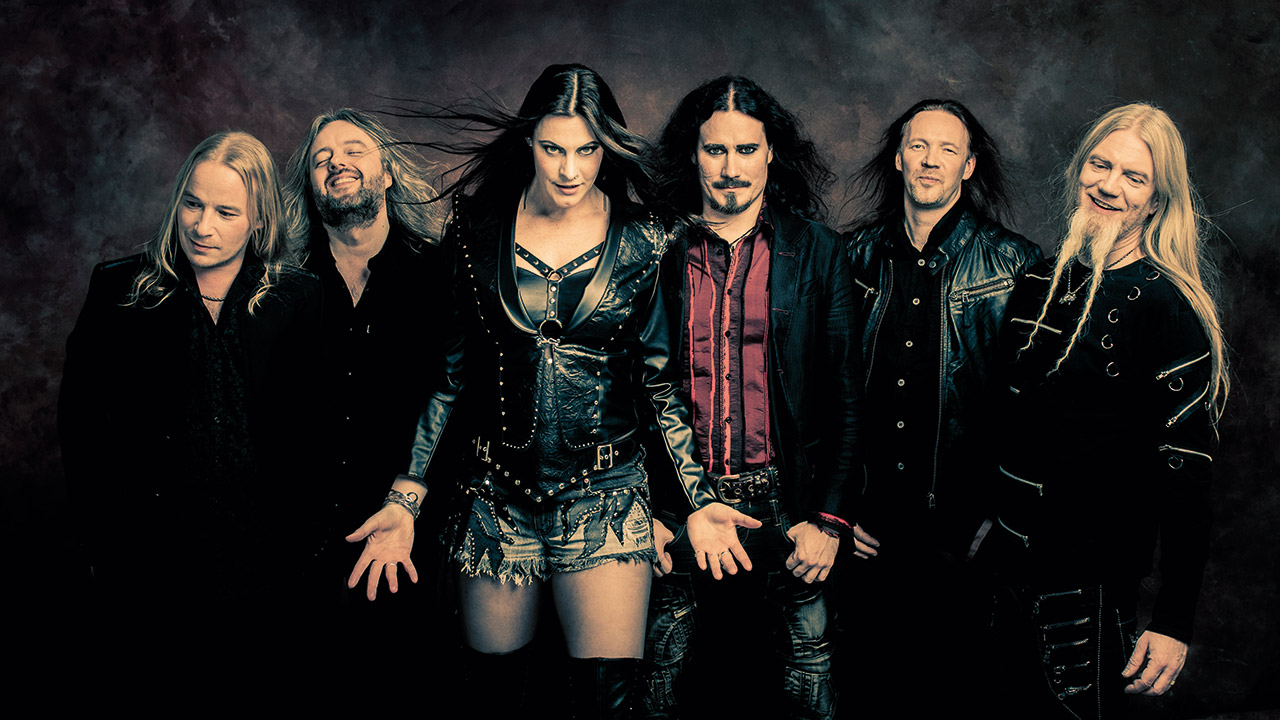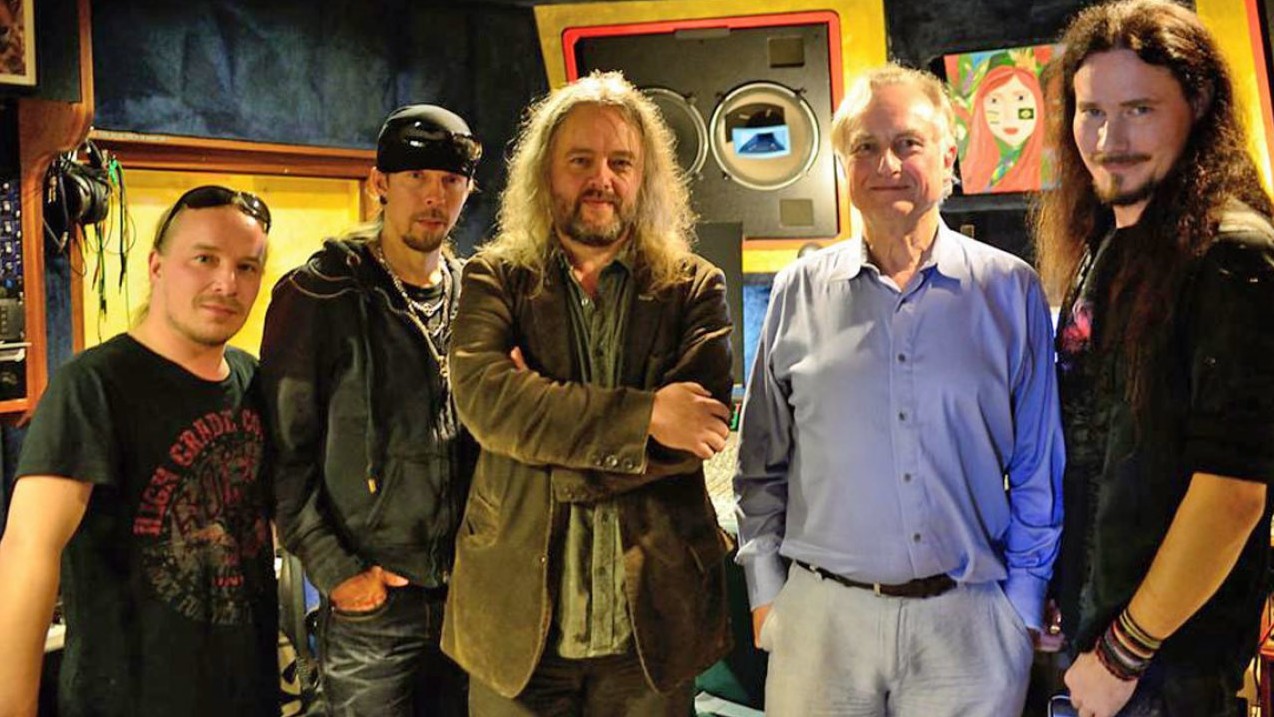There’s something almost incongruous about seeing a major musical figure in awe of another person, but Nightwish mainman Tuomas Holopainen clearly feels a little intimidated by being in the same room as evolutionary biologist Professor Richard Dawkins.
“He’s a hero of mine,” Holopainen later admits, after the subject of his praise has left the building. “I studied biology for six months at university. But then Nightwish’s debut album [Angels Fall First, 1996] was released and that took over my life.”
However, the man has never lost his fascination for science, which eventually led him to read Dawkins’ books.
“Troy Donockley from the band introduced me to your work,” Holopainen explained earlier to the biologist. “He said it was wonderful stuff. The first one I read was The Ancestor’s Tale, and now I’ve read everything you’ve had published, except your autobiography [An Appetite For Wonder].”
It was this path that eventually led to the seemingly unlikely collaboration between the renowned scientist and the Finnish band on the latter’s new album Endless Forms Most Beautiful.
“I’m intrigued by evolution, the natural world and the cosmos,” says the Nightwish frontman. “I had the idea of doing a massive song about the evolution of life. I called it The Greatest Show On Earth, which is also the title of one of his books. So it appeared to be a perfect match.
“I sent a handwritten letter, because I thought it was more likely to be read, asking him if he’d guest on the album. Two weeks later I got an email back…”
“I long ago forgot how to write,” laughs Dawkins. “I will admit I had never heard of Nightwish before I got this request. But my assistant had, and said they were very good, so I agreed to be involved.”
Last October, Dawkins met Holopainen for the first time, at a studio in Oxford where his narrative parts were recorded. “It was only for an hour, but in that time we got about 30 passages recorded,” says Holopainen.
“Some of these were from my own writings,” adds Dawkins. “Others from Carl Sagan, Walt Whitman, Charles Darwin and also from Tuomas.”
“I then selected what I thought worked best with the music,” confirms Holopainen. “But the rest won’t be discarded. Some will be incorporated into the live show.”
By his own admission, Dawkins isn’t exactly in tune with the world of progressive music – he’s a fan of classical works. “People are often surprised that I can love the music of Haydn, Bach and Handl when so much of it was steeped in the church and I am an atheist. However, you have to appreciate that at the time they were composing, it was the church who had the money to commission music, and composers inevitably went where the money was. Otherwise, it might have been so different. We could have been celebrating Haydn’s Origins Of Life Oratorio, Bach’s Evolution Cantata or Beethoven’s Mesozoic Symphony.”

Both parties hope this collaboration will prove to be symbiotic, and lead to a greater understanding of the poetry of science. As Dawkins insists: “Science should be an inspiration to musicians – it is a positive thing. I have always emphasised the importance of the poetic approach to science. I have never been a fan of the hands-on approach, where you have to experiment and use a Bunsen burner. For me, that misses the point. What we should be celebrating is the poetry within reality.”
“I would love to believe that there will be Nightwish fans who will be inspired by this album to read some of Dawkins’ books,” enthuses Holopainen. “Science was always the catalyst here. Praising the natural world, making science more approachable, more poetic.”
“The reverse might also be possible,” says Dawkins. “There could be those who’ve read some of my books who’ll now listen to this album. I’d say this was a healthy relationship between science and music.”
When Dawkins recorded his narration, he did so without ever hearing a note of the music. It was something Holopainen deliberately enforced. “I wanted him to come to it fresh. No preconceptions. The music was already set in stone, but I am a fan both of his voice and what he says. I didn’t want anything tailored to suit what was already there. Because of this, the performance is more powerful.”
And the Nightwish man also furiously debunks any suggestion that having Dawkins on the album was done purely to stir up controversy. “There have been people on Facebook who’ve suggested the only reason he’s here is for shock value, and to piss off religious people…”
“I have never done anything to cause shock,” interjects Dawkins. “This is science. It’s not being done to annoy religion.”
“The thing is, if you want to scare people these days, forget about Satan and drugs. Bring on the evolutionary biologist,” says Holopainen. “What he has to say really scares some people!”
The collaboration between the pair will go further now, with Dawkins expected to guest at Nightwish’s Wembley Arena show on December 19. For the scientist, it will be new territory to explore. “I did play the electronic wind instrument [EWI] live once at the Cannes Film Festival. It was part of a psychedelic presentation by Saatchi & Saatchi. I learned to play the clarinet when I was young, so playing this was no problem.
“I also enjoy giving lectures. Especially when you are in a large theatre and have a very good sound system. It can almost feel like you have the audience eating out of your hand. But this progressive music world… that’s all new to me.”

So which prog artists does Holopainen think Dawkins should check out? “Well, I know he likes Vangelis, as I do. And I guess… well, maybe you should start with Pink Floyd. I don’t think it would be wise to recommend anything too heavy!”
“My wife goes to a lot of concerts of this type,” admits Dawkins, “but I have never gone with her. Maybe I should start to venture into this area. When I give lectures, I like to think out loud, rather than follow scripts. Anybody can read your notes, but if you are spontaneous and grasp the thought as it comes to you, then you are capturing the spirit of the moment. Isn’t that what being progressive is all about?”
Now that this unlikely pairing has proved itself mutually respectful, is it possible there will a further collaboration on a future project? Maybe working together from the start? “I haven’t thought about that,” shrugs Holopainen, “but I wouldn’t rule it out.”
“I have never written serious lyrics before,” says Dawkins. “I have come up with nonsense verses, but that’s very different. I feel a lot of what I write is prose poetry. And that’s the artistic expression I feel most confident in doing.”
After Dawkins leaves, Holopainen notices that the evolutionary biologist has been doodling on a piece of paper. He eagerly snatches it up.
“I’m keeping this,” the Nightwish master exclaims excitedly. “Yes, I am a fanboy!”
This article originally appeared in issue 54 of Prog Magazine.

